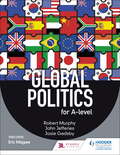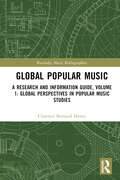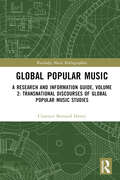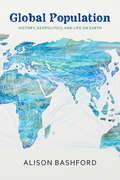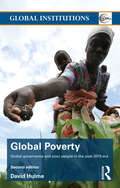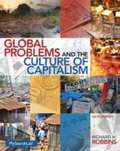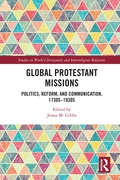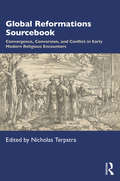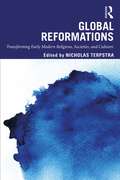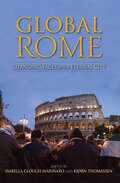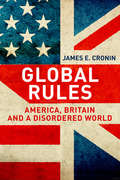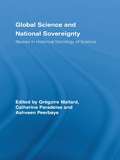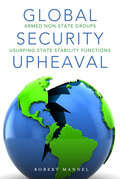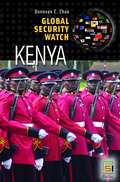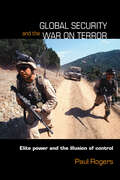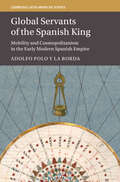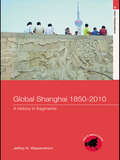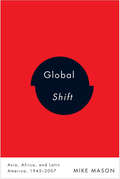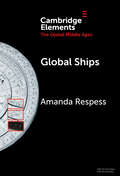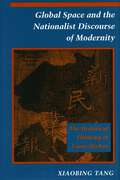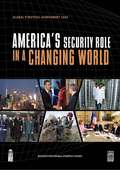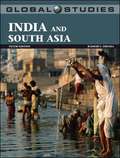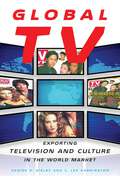- Table View
- List View
Global Politics for A-level
by Robert Murphy John Jefferies Josie GadsbyExpand your students' political thinking and put global politics into context with this brand new textbook; created for the 2017 politics specifications. Combining up-to date commentary and analysis with case studies and features, this textbook will help develop an understanding of politics from the local to the international, revealing how political issues affect us all.- Comprehensive coverage of the latest developments in global politics - Analysis of the perspectives of liberalism and realism- Definitions of key terms and concepts to help clarify knowledge and understanding of political language- Exam focus sections at the end of each chapter to test and develop understanding of key topics, offering practice for short and essay questions
Global Popular Music: A Research and Information Guide, Volume 1: Global Perspectives in Popular Music Studies (Routledge Music Bibliographies)
by Clarence Bernard HenryGlobal Popular Music: A Research and Information Guide offers an essential annotated bibliography of scholarship on popular music around the world in a two-volume set. Featuring a broad range of subjects, people, cultures, and geographic areas, and spanning musical genres such as traditional, folk, jazz, rock, reggae, samba, rai, punk, hip-hop, and many more, this guide highlights different approaches and discussions within global popular music research. This research guide is comprehensive in scope, providing a vital resource for scholars and students approaching the vast amount of publications on popular music studies and popular music traditions around the world. Thorough cross-referencing and robust indexes of genres, places, names, and subjects make the guide easy to use.Volume 1, Global Perspectives in Popular Music Studies, situates popular music studies within global perspectives and geocultural settings at large. It offers over nine hundred in-depth annotated bibliographic entries of interdisciplinary research and several topical categories that include analytical, critical, and historical studies; theory, methodology, and musicianship studies; annotations of in-depth special issues published in scholarly journals on different topics, issues, trends, and music genres in popular music studies that relate to the contributions of numerous musicians, artists, bands, and music groups; and annotations of selected reference works.
Global Popular Music: A Research and Information Guide, Volume 2: Transnational Discourses of Global Popular Music Studies (Routledge Music Bibliographies)
by Clarence Bernard HenryGlobal Popular Music: A Research and Information Guide offers an essential annotated bibliography of scholarship on popular music around the world in a two-volume set. Featuring a broad range of subjects, people, cultures, and geographic areas, and spanning musical genres such as traditional, folk, jazz, rock, reggae, samba, rai, punk, hip-hop, and many more, this guide highlights different approaches and discussions within global popular music research. This research guide is comprehensive in scope, providing a vital resource for scholars and students approaching the vast amount of publications on popular music studies and popular music traditions around the world. Thorough cross-referencing and robust indexes of genres, places, names, and subjects make the guide easy to use.Volume 2, Transnational Discourses of Global Popular Music Studies, covers the geographical areas of North America: United States and Canada; Central America, Caribbean, and South America/Latin America; Europe; Africa and Middle East; Asia; and areas of Oceania: Aotearoa/New Zealand, Australia, and Pacific Islands. It provides over twenty-four hundred annotated bibliographic entries covering discourses of extensive research that extend beyond the borders of the United States and includes annotated entries to books, book series, book chapters, edited volumes, special documentaries and programming, scholarly journal essays, and other resources that focus on the creative and artistic flows of global popular music.
Global Population: History, Geopolitics, and Life on Earth
by Alison BashfordConcern about the size of the world's population did not begin with the "population bomb" in 1968. It arose in the aftermath of World War I and was understood as an issue with far-reaching ecological, agricultural, economic, and geopolitical consequences. The world population problem concerned the fertility of soil as much as the fertility of women, always involving both "earth" and "life." Global Population traces the idea of a world population problem as it evolved from the 1920s through the 1960s. The growth and distribution of the human population over the planet's surface came deeply to shape the characterization of "civilizations" with different standards of living. It forged the very ideas of development, demographically defined three worlds, and, for some, an aspirational "one world." Drawing on international conference transcripts and personal and organizational archives, this book reconstructs the twentieth-century population problem in terms of migration, colonial expansion, globalization, and world food plans. Population was a problem in which international relations and intimate relations were one. Global Population ultimately shows how a geopolitical problem about sovereignty over land morphed into a biopolitical solution, entailing sovereignty over one's person.
Global Population: History, Geopolitics, and Life on Earth (Columbia Studies in International and Global History)
by Alison BashfordConcern about the size of the world's population did not begin with the "population bomb" in 1968. It arose in the aftermath of World War I and was understood as an issue with far-reaching ecological, agricultural, economic, and geopolitical consequences. The world population problem concerned the fertility of soil as much as the fertility of women, always involving both "earth" and "life."Global Population traces the idea of a world population problem as it evolved from the 1920s through the 1960s. The growth and distribution of the human population over the planet's surface came deeply to shape the characterization of "civilizations" with different standards of living. It forged the very ideas of development, demographically defined three worlds, and, for some, an aspirational "one world."Drawing on international conference transcripts and personal and organizational archives, this book reconstructs the twentieth-century population problem in terms of migration, colonial expansion, globalization, and world food plans. Population was a problem in which international relations and intimate relations were one. Global Population ultimately shows how a geopolitical problem about sovereignty over land morphed into a biopolitical solution, entailing sovereignty over one's person.
Global Poverty: Global governance and poor people in the Post-2015 Era (Global Institutions)
by David HulmeAround 1.4 billion people presently live in extreme poverty, and yet despite this vast scale, the issue of global poverty had a relatively low international profile until the end of the 20th century. In this important new work, Hulme charts the rise of global poverty as a priority global issue, and its subsequent marginalisation as old themes edged it aside (trade policy and peace-making in regions of geo-political importance) and new issues were added (terrorism, global climate change and access to natural resources). Key updates for the new edition: evaluation of the post-2015 Development Agenda and the Rio+20 exploration of how Colombia and Brazil are pushing a sustainability agenda as a Southern perspective to challenge the aid focus of OECD post-MDGs interests examination and discussion of the gradual shift of power and influence to the BRICs and emerging regional powers (Indonesia, Turkey, South Africa) but the lack of change in global institutions exploration of Russia’s lack of participation in the development agenda The first book to tackle the issue of global poverty through the lens of global institutions; this fully updated volume provides an important resource for all students and scholars of international relations, development studies and international political economy.
Global Powers
by Ralph SchroederMichael Mann is a central figure in contemporary sociology. His analysis of how the four sources of social power - ideological, economic, military and political - have shaped world history is a major contribution to social science. In this volume, distinguished scholars assess Mann's work, focusing on his final two volumes of Sources of Social Power, which deal with the twentieth and twenty-first centuries. They tackle some of the major themes in Mann's work including globalisation, American empire and the recent financial crisis. They also question his stance on some perennial topics in sociology: is the trajectory of American society 'exceptional'? How is military power different from the other sources of power? What is the role of agency and ideology in social change? How do the relations between states affect domestic social development? Global Powers will provoke debate among all those interested in understanding the next phase of globalisation.
Global Problems and the Culture of Capitalism
by Richard H. Robbins<p>Examines the development and impact of capitalist culture. <p>From its roots more than 500 years ago to the present day, capitalism expanded from Western Europe to the United States and then to much of the rest of the world. This expansion has not gone uncontested; resistance has been both direct and indirect, including political, religious, and social protest, and even revolution. How and why capitalist culture developed and the reasons why some groups resisted and continue to resist its development are among the issues explored in Global Problems and the Culture of Capitalism, 6/e.</p>
Global Protestant Missions: Politics, Reform, and Communication, 1730s-1930s (Studies in World Christianity and Interreligious Relations)
by Jenna M. GibbsThe book investigates facets of global Protestantism through Anglican, Quaker, Episcopalian, Moravian, Lutheran Pietist, and Pentecostal missions to enslaved and indigenous peoples and political reform endeavours in a global purview that spans the 1730s to the 1930s. The book uses key examples to trace both the local and the global impacts of this multi-denominational Christian movement. The essays in this volume explore three of the critical ways in which Protestant communities were established and became part of a worldwide network: the founding of far-flung missions in which Western missionaries worked alongside enslaved and indigenous converts; the interface between Protestant outreach and political reform endeavours such as abolitionism; and the establishment of a global epistolary through print communication networks. Demonstrating how Protestantism came to be both global and ecumenical, this book will be a key resource for scholars of religious history, religion and politics, and missiology as well as those interested in issues of postcolonialism and imperialism.
Global Reformations Sourcebook: Convergence, Conversion, and Conflict in Early Modern Religious Encounters
by Nicholas TerpstraThis volume of primary sources brings together letters, memoirs, petitions, tracts, and stories related to religion and reform around the globe from the fifteenth through the eighteenth centuries. The common subject of the sources is the Reformation, and these texts demonstrate the themes and impacts of religious reform in Europe and around the globe. Scholars once framed the Reformation as a sixteenth-century European dispute between Protestant and Catholic churches and states, but now look expansively at connections and entanglements between different confessions, faiths, time periods, and geographical areas. The Reformation coincided with Europeans’ expanding reach across the globe as traders, settlers, and colonists, but the role that religion played in this drive has yet to be fully explored. These readings highlight these reformers’ engagements with Judaism, Islam, Buddhism, and indigenous spirituality, and the entanglement of Christian reform with colonialism, trade, enslavement, and racism. Offering a sustained, comparative, and interdisciplinary exploration of religious transformations in the early modern world, this collection of primary sources is invaluable to both undergraduate and postgraduate students working on theology, the Reformation, and early modern society.
Global Reformations: Transforming Early Modern Religions, Societies, and Cultures
by Nicholas TerpstraGlobal Reformations offers a sustained, comparative, and interdisciplinary exploration of religious transformations in the early modern world. The volume explores global developments and tracks the many ways in which Reformation movements shaped relations of Christians with other Christians, and also with Jews, Muslims, Buddhists, and aboriginal groups in the Americas. Contributions explore the negotiations, tensions, and contacts that developed across social, gender, and religious lines in different parts of the globe, focusing on how different convictions about religious reform and approaches to it shaped social action and cross-confessional encounters. The essays explore the convergence of religious reform, global expansion, and governmental consolidation in the early modern world and examine the Reformation as a global phenomenon; the authors ask how a global frame complicates our understanding of what the Reformation itself was and offer a unique and up-to-date examination of the Reformation that broadens readers’ understanding in creative and useful ways. Demonstrating new research and innovative approaches in the study of cross-cultural contact during the early modern period, this volume is ideal for advanced undergraduates and graduates of early modern history, religious history, women's & gender studies, and global history.
Global Rome: Changing Faces Of The Eternal City (New Anthropologies of Europe)
by Bjørn Thomassen Isabella Clough MarinaroIs 21st-century Rome a global city? Is it part of Europe's core or periphery? This volume examines the "real city" beyond Rome's historical center, exploring the diversity and challenges of life in neighborhoods affected by immigration, neoliberalism, formal urban planning, and grassroots social movements. The contributors engage with themes of contemporary urban studies-the global city, the self-made city, alternative modernities, capital cities and nations, urban change from below, and sustainability. Global Rome serves as a provocative introduction to the Eternal City and makes an original contribution to interdisciplinary scholarship.
Global Rules
by Prof. James E. CroninThe Second World War created and the Cold War sustained a #147;special relationship” between America and Britain, and the terms on which that decades-long conflict ended would become the foundation of a new world order. In this penetrating analysis, a new history of recent global politics, author James Cronin explores the dramatic reconfiguring of western foreign policy that was necessitated by the interlinked crises of the 1970s and the resulting global shift toward open markets, a movement that was eagerly embraced and encouraged by the U. S. /U. K. partnership. Cronin’s bold revisionist argument questions long-perceived views of post#150;World War II America and its position in the world, especially after Vietnam. The author details the challenges the economic transition of the 1970s and 1980s engendered as the United States and Great Britain together actively pursued their shared ideal of an international assemblage of market-based democratic states. Cronin also addresses the crises that would sorely test the system in subsequent decades, from human rights violations and genocide in the Balkans and Africa to 9/11 and militant Islamism in the Middle East to the #147;Great Recession” of 2008.
Global Science and National Sovereignty (Routledge Studies in the History of Science, Technology and Medicine)
by Grégoire Mallard Catherine Paradeise Ashveen PeerbayeGlobal Science and National Sovereignty: Studies in Historical Sociology of Science provides detailed case studies on how sovereignty has been constructed, reaffirmed, and transformed in the twentieth century by the construction of scientific disciplines, knowledge practices, and research objects. Interrogating the relationship of the sovereign power of the nation state to the scientist's expert knowledge as a legitimating – and sometimes challenging – force in contemporary society, this book provides a staggering range of case studies in its exploration of how different types of science have transformed our understanding of national sovereignty in the last century. From biochemical sciences in Russia, to nuclear science in the US and Europe, from economics in South Asia, to climatology in South America, each chapter demonstrates the role that scientists play in the creation of nation-states and international organizations. With an array of experts and scholars, the essays in Global Science and National Sovereignty: Studies in Historical Sociology of Science offer a complete redefinition of the modern concept of sovereignty and an illuminating reassessment of the role of science in political life.
Global Security Upheaval: Armed Non-state Groups Usurping State Stability Functions
by Robert MandelThis book calls into question the commonly held contentions that central governments are the most important or even the sole sources of a nation's stability, and that subnational and transnational nonstate forces are a major source of global instability. By assessing recent real-world trends, Mandel reveals that areas exist where it makes little sense to rely on state governments for stability, and that attempts to bolster such governments to promote stability often prove futile. He demonstrates how armed nonstate groups can sometimes provide local stability better than states, and how power-sharing arrangements between states and armed nonstate groups may sometimes be viable. He concludes that these trends in the international setting call for major shifts in our understanding of what constitutes stable governance — proposing that we adopt a fluid "emergent actor" approach. And he calls for significant deviation from standard policy responses to the opportunities and dangers posed by nontraditional sources of national authority.
Global Security Watch: Kenya
by Donovan C. ChauAn original study on the strategic dimensions of Kenya encompasses in-depth examinations of the Kenya Armed Forces, political and military relations with key neighboring countries, and Kenya's crucial strategic relationship with the United States. Includes biographies of Kenya's three presidents since independence. Presents interviews with influential figures. Offers a chronology of Kenya's strategic history from precolonial times to the present. Provides a political map of the African continent and a detailed political map of Kenya. A multifaceted bibliography of key political and military sources--historical, scholarly, and contemporary.
Global Security and the War on Terror: Elite Power and the Illusion of Control (Contemporary Security Studies)
by Paul RogersAs the ‘War on Terror’ evolves into the ‘Long War’ against Islamo-fascism, it demands an enduring commitment to ensuring the security of the United States and its allies. This policy is based on the requirement to maintain control in a fractured and unpredictable global environment, while paying little attention to the underlying issues that lead to insecurity. It is an approach that is manifestly failing, as the continuing problems in Afghanistan and Iraq demonstrate. Moreover, ‘control’ implies the maintenance of a global order that focuses on power remaining in the hands of a transnational elite community, principally focused on North America and Western Europe, but extending worldwide. This elite largely ignores socio-economic divisions and environmental constraints, and sees continuing stability as being best achieved by the maintenance of the status quo, using force when necessary. This collection of essays by Professor Paul Rogers argues that this post-Cold War security paradigm is fundamentally misguided and unsustainable. It concludes with two new essays on the need for a new conception of global security rooted in justice and emancipation. Global Security and the War on Terror will be essential reading for students and scholars of security studies, the Cold War, international relations and development studies.
Global Servants of the Spanish King: Mobility and Cosmopolitanism in the Early Modern Spanish Empire (Cambridge Latin American Studies)
by Adolfo Polo y La BordaFrom 1580 to 1700, low-ranking Spanish imperial officials ceaselessly moved across the Spanish empire, and in the process forged a single coherent political unit out of multiple heterogeneous territories, creating the earliest global empire. Global Servants of the Spanish King follows officials as they itinerated between the Americas, Asia, Europe, and Africa, revealing how their myriad experiences of service to the king across a variety of locales impacted the governance of the empire, and was an essential mechanism of imperial stability and integration. Departing from traditional studies which focus on high-ranking officials and are bounded by the nation-state, Adolfo Polo y La Borda centers on officials with local political and administrative duties such as governors and magistrates, who interacted daily with the crown's subjects across the whole empire, and in the process uncovers a version of cosmopolitanism concealed in conventional narratives.
Global Shanghai, 1850-2010: A History in Fragments (Asia's Transformations/Asia's Great Cities)
by Jeffrey N. WasserstromThis book explores the play of international forces and international ideas about Shanghai, looking backward as far as its transformation into a subdivided treaty port in the 1840s, and looking forward to its upcoming hosting of China's first World's Fair, the 2010 Expo. As such, Global Shanghai is a lively and informative read for students and scholars of Chinese studies and urban studies and anyone interested in the history of Shanghai.
Global Shift
by Mike MasonAn insightful account of the recent histories of nearly two dozen states, Global Shift is a dynamic, nuanced study of what is sometimes referred to as the "Third World." Seeking to illuminate the deep economic chasm between the global East and West, Mike Mason presents a new perspective of decolonization, neocolonialism, and global capitalism in the context of the rise and decline of a hegemonic America. Global Shift begins with the end of the Second World War, telling the story of a ravaged, but still dominant West, as well as the emergence of the Third World - a zone of competition and contention ultimately engulfed by the rising tide of capitalist development. Mason suggests that historic focus on the West as the centre of the global economy may soon be superseded by the rise of the East Drawing on history, comparative politics, and development studies, Global Shift traces the contours of state histories from Asia, Africa, and Latin America to create a comprehensive portrait of the current state of global politics that is breathtaking in scope.
Global Ships: Seafaring, Shipwrecks, and Boatbuilding in the Global Middle Ages (Elements in the Global Middle Ages)
by Amanda RespessGlobal Ships examines the major seafaring traditions and technologies that engendered long-distance connections across the world's oceans during the Global Middle Ages. Between the years 500–1500 CE, maritime trade networks spanning the seas globalized commodities, religions, and trade diasporas in an increasingly mobile world. Focusing on shipbuilding traditions, nautical cultures, sailing itineraries, and examples of recovered shipwrecks and cargoes from around the world, Global Ships provides an expert overview of the major vessels that sailed the seas in the Global Middle Ages. A concise interpretive guide to global maritime technologies and cultures for researchers, teachers, and students, Global Ships highlights essential historical context, technological case studies, and logics of seafaring around the world before the modern age.
Global Space and the Nationalist Discourse of Modernity: The Historical Thinking of Liang Qichao
by Xiaobing TangThis book reexamines the historical thinking of Liang Qichao (1873-1929), one of the few modern Chinese thinkers and cultural critics whose appreciation of the question of modernity was based on first-hand experience of the world space in which China had to function as a nation-state. It seeks to demonstrate that Liang was not only a profoundly paradigmatic modern Chinese intellectual but also an imaginative thinker of worldwide significance. By tracing the changes in Liang's conception of history, the author shows that global space inspired both Liang's longing for modernity and his critical reconceptualization of modern history. Spatiality, or the mode of determining spatial organization and relationships, offers a new interpretive category for understanding the stages in Liang's historical thinking. Liang's historical thinking culminated in a global imaginary of difference, which became most evident in the shift from his earlier proposal for a uniform national history to one that mapped "cultural history." His reaffirmation of spatiality, a critical concept overshadowed by the modernist obsession with time and history, made it both necessary and possible for him to redesign the project of modernity. Finally, the author suggests that the reconciliation of anthropological space with historical time that Liang achieved makes him abundantly contemporary with our own time, both inextricably modern and postmodern.
Global Strategic Assessment 2009: America's Security Role in a Changing World
by Patrick M. Cronin Institute for National Strategic Studies (U.S.), (Institute for National Strategic Studies National Defense University (U.S.) (National Defense UniversityOffers a conceptual pathway for U.S. policymakers to begin recalibrating America's security role to reverse what has appeared to be a widening gap between U.S. ends and means, now and in the future. Provides an overview of eight broad trends shaping the international security environment; a global analysis of the world's seven regions, to consider important developments in their distinctive neighborhoods; and, an examination of prospective U.S. contributions, military capabilities and force structure, national security organization, alliances and partnerships, and strategies.
Global Studies: India and South Asia (10th edition)
by James Norton Ramesh C. DhussaGlobal Studies is a unique series designed to provide comprehensive background information and selected world press articles on the regions and countries of the world. Each Global Studies volume includes an annotated listing of World Wide Web sites and is now supported by an online Instructor's Resource Guide. Visit our website for more information: www.mhhe.com/globalstudies.com.
Global TV: Exporting Television and Culture in the World Market
by C. Lee Harrington Denise D. BielbyA reporter for the Los Angeles Times once noted that “I Love Lucy is said to be on the air somewhere in the world 24 hours a day.” That Lucy’s madcap antics can be watched anywhere at any time is thanks to television syndication, a booming global marketplace that imports and exports TV shows. Programs from different countries are packaged, bought, and sold all over the world, under the watch of an industry that is extraordinarily lucrative for major studios and production companies.In Global TV, Denise D. Bielb and C. Lee Harrington seek to understand the machinery of this marketplace, its origins and history, its inner workings, and its product management. In so doing, they are led to explore the cultural significance of this global trade, and to ask how it is so remarkably successful despite the inherent cultural differences between shows and local audiences. How do culture-specific genres like American soap operas and Latin telenovelas so easily cross borders and adapt to new cultural surroundings? Why is The Nanny, whose gum-chewing star is from Queens, New York, a smash in Italy? Importantly, Bielby and Harrington also ask which kinds of shows fail. What is lost in translation? Considering such factors as censorship and other such state-specific policies, what are the inevitable constraints of crossing over?Highly experienced in the field, Bielby and Harrington provide a unique and richly textured look at global television through a cultural lens, one that has an undeniable and complex effect on what shows succeed and which do not on an international scale.
